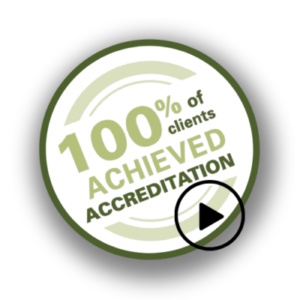When it passed the Family First Prevention Services Act (FFPSA) last February, Congress aimed to change the face of child welfare, in part by implementing a funding shift that restricts the use of Title IV-E financing for out-of-home “congregate care” placements. The goal is to increase assurances that children will be kept in family-like settings whenever possible.
One section of FFPSA defines a Qualified Residential Treatment Program (QRTP), which is one of the few settings that will be allowed to receive federal reimbursements after the first two weeks a child has been in care.
A key provision of the Act is that QRTPs must be accredited by a national organization. This is a long process that should be undertaken as soon as possible because time to comply with the act is running out. Do not underestimate the effort it takes to achieve national accreditation. The time to begin the process is now.
Congregate care providers must become QRTPs by October 1, 2019 if they want to be eligible for this designation. While states have the option to extend this deadline for up to two years, all providers should be working toward next year’s October 1 deadline.
What does it mean to become a QRTP? In summary, the service provider must:
- Be licensed and be accredited by at least one of three federally approved accreditors: The Commission on Accreditation of Rehabilitation Facilities (CARF), Council on Accreditation (COA) or The Joint Commission (formerly JCAHO)
- Use a trauma-informed treatment model
- Have registered or licensed nursing staff and other licensed clinical staff, available 24/7, on-site according to the treatment model
- Demonstrate family engagement and outreach, including siblings, in the child’s treatment
- Provide discharge planning and family-based aftercare supports for at least six months post-discharge
The accreditation mandate sets a high bar, but one that helps ensure the delivery of high-quality care. Organizations that earn accreditation have reached beyond the minimum licensing standards and made a long-term commitment to strong governance, program consistency, outcome measurement and continuous improvement throughout their agencies.
Accreditation requires organizations to undergo an objective review by an independent accrediting body and signifies that they are effectively managing their resources and enhancing the quality of life for the population served.
Many organizations underestimate the time required to prepare for and become accredited. In general, it takes 12 to 18 months to prepare for national accreditation, sometimes more, sometimes less, depending on the original state of readiness.
The time needed to complete the accreditation process includes, but is not limited to, the following:
- Selecting an accrediting body
- Securing budgetary allotment and board approval
- Preparing standards-compliant policies, procedures and protocols
- Implementing accreditation standards
- Making operational and service delivery improvements, as necessary
- Participating in a mock survey
Because Family First represents a looming, national deadline for accreditation, there will be many hundreds (if not thousands) of organizations trying to become accredited at the same time. And the accrediting bodies only have a finite amount of capacity to accommodate all of these applicants.
Therefore, every organization should begin the accreditation process as soon as possible to get ahead of the rush. Once the process begins, effective project management and support from leadership will help ensure that accreditation activities are not derailed by other priorities that may crop up.
For information on how to effectively and pro-actively prepare for CARF, COA or Joint Commission accreditation, please contact Accreditation Guru, Inc. at Info@AccreditationGuru.com or 212.209.0240.









